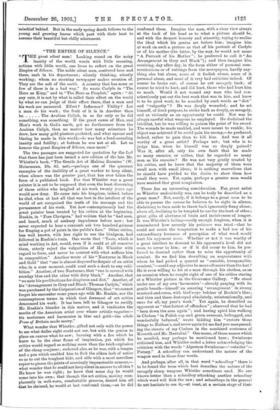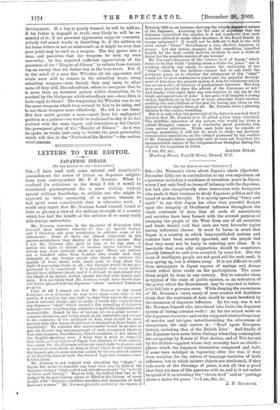" THE EMPIRE OF SILENCE."
"THE great silent men ! Looking round on the noisy inanity of the world, words with little meaning, actions with little worth, one loves to reflect on the great Empire of Silence. The noble silent men, scattered here and there, each in his department ; silently thinking, silently working; whom no morning newspaper makes mention of. They are the salt of the earth. A country that has none or few of these is in a bad way." So wrote Carlyle in " The Hero as King," and in " The Hero as Prophet," again : " At any rate, it is not by what is called their effect on the world by what we can judge of their effect there, that a man and his work are measured. Effect ? Influence ? Utility P Let a man do his work ; the fruit of it is in Another than he The Arabian Caliph, in so far only as he did something, was something. If the great cause of Man, and Man's work in God's earth, got no furtherance from the Arabian Caliph, then no matter how many scimetars he drew, how many gold piasters pocketed, and what uproar and blaring he made in this world,—he was but a loud-sounding inanity and futility; at bottom he was not at all. Let us honour the great Empire of Silence, once more."
The two passages are suggested for quotation by the fact that there has just been issued a new edition of the late Mr. Whistler's book, "The Gentle Art of Making Enemies" (W. Heinemann, 10s. 6d. net),—perhaps one of the queerest examples of the inability of a great worker to keep silent, when silence was the greater part, that has ever taken the form of a published book. For that Whistler was a great painter it is not to be supposed that even the least discerning of those critics who laughed at his work twenty years ago would now deny. He came into his kingdom, indeed, before he died, when at last all that was best in the intellect of the world of art recognised the truth of his message and the permanence of his work. Yet bow contemptuously had the great painter been treated by his critics at the beginning. Ruskin, in "Fors Clavigera," had written that he "had seen, and heard, much of cockney impudence before now ; but never expected to hear a coxcomb ask two hundred guineas for flinging a pot of paint in the public's face." Other critics, less well known, with less right to use the bludgeon, had followed in Ruskin's train. One wrote that " Taste, which is mind working in Art, would, even if it could at all conceive them, utterly reject the vulgarities of Mr. Whistler with regard to form, and never be content with what suffices him in composition." Another wrote of his " Nocturne in Black and Gold " that "one is almost disposed to despair of an artist who, in a sane moment, could send such a daub to any exhi- bition." Another, of two Nocturnes, that "one is covered with smudgy blue and the other with dirty black." Another, that "we note his predilections for dinginess and dirt." Another, of his "Arrangement in Grey and Black: Thomas Carlyle," which was purchased by the Corporation of Glasgow, that "we cannot forget his encounter some years ago with Mr. Ruskin, nor the contemptuous terms in which that foremost of art critics denounced his work. It has been left to Glasgow to rectify Mr. Ruskin's blunder in this matter, and it vindicates the merits of the American artist over whose artistic vagaries— his nocturnes and harmonies in blue and gold—the whole Press of Britain made merry."
What wonder that Whistler, gifted not only with the power to see what duller sight could not see, but with the genius to place on canvas what he saw ; burning with a fire which he knew to be the clear flame of inspiration, yet which his critics would regard as nothing more than the trick-explosion of the cheap conjurer; endowed also, as he was, with a tongue and a pen which enabled him to flick the silken lash of satire so as to cut the toughest hide, and able with a most merciless rapier to pierce the joints of seemingly impenetrable armour,— what wonder that he could not keep silent in answer to all this P He knew he was right ; he knew that some day he would come into his own ; that though the art critics, moving com- placently in well-worn, comfortable grooves, denied him all that he claimed, he would at last confound them,—as he did
confound them. Imagine the man, with a clear view always at the back of his head as to what a picture should be, and with the deepest honesty and sincerity, trying to realise the ideal which his genius set before him ; imagine him at work on such a picture as that of his portrait of Carlyle or of his mother (the latter, by the way, he would not name "A Portrait of his Mother "; he preferred to call it "An Arrangement in Grey and Black ") ; and then imagine him receiving, day after day, in the form either of personal com- munications or of cuttings from the newspapers, hardly any- thing else but abuse, some of it foolish abuse, some of it personal abuse, and most of it very bad criticism indeed. Of course he broke out; of course he cut savagely back; of course he tried to hurt, and did hurt, those who had hurt him so much. Would it not wound any man who had con- scientiously put out the best work that was in him, and knew it to be good work, to be assailed by such words as " dirt" and " vulgarity " P He was deeply wounded ; and he set himself, of fixed purpose, to strike back as deeply, as savagely, and as viciously as on opportunity he could. Nor was he always careful what weapons he employed. He disdained the brickbat, but he was willing to poison the point of his sword. The wounds he made rankled, and were meant to rankle ; his Object was achieved if he could pain his enemy,—he preferred, indeed, rather to pain than to kill him. And was it all worthy of a great artist? Perhaps not ; but who is' to judge him, when he himself was so deeply pained ? Was it after all, only his own fault that he made so many enemies, or rather, that he regarded so many men as his enemies ? He was not very gently treated by his critics, and he knew that the majority of them were small men with small ideas; it is nothing marvellous that he should have yielded to the desire to show them bow small they were. Yet, again, perhaps a greater man would have resisted that great temptation.
There lies an interesting consideration. For, great artist as Whistler undoubtedly was, can he truly be described as a great man ? Not, surely, if it belongs to a great man to be able to pursue the course he believes to be right in silence, disdaining to turn aside to throw back ignorantly flung abuse; above all, declining to be tempted to use for the hurt of other.; great gifts of alertness of brain and incisiveness of tongue. It was Whistler's failing—easily enough forgiven, when it is remembered how severely his patience was tried—that he could not resist the temptation to make a bad use of his extraordinary keenness of perception of what word would hurt his opponent most. Whether or not it was worthy of a great intellect to descend to his opponent's level did not seem to occur to him ; or if it did occur to him, he pre- ferred to descend rather than to miss the opportunity of combat. So we find him describing an acquaintance with whom he had picked a quarrel as " amiable, irresponsible, esurient,"—could any adjective be more offensive than the last ? He is even willing to bit at a man through his clothes, as on an occasion when he caught sight of one of his critics staring at a Whistler picture in the Grosvenor Gallery. "He stood under one of my own harmonies '—already gasping with its gentle breath—himself an amazing arrangement' in strong mustard-and-cress, with bird's-eye belcher of Reckitt's blue ; and then and there destroyed absolutely, unintentionally, and once for all, my year's work." Yet again, he described an opponent as "that fattest of offenders" ; observed that he had " been down the area again " ; and having spied him walking in Chelsea " in Polish cap and green overcoat, befrogged, and wonderfully befurred," wrote bidding him "restore those things to Nathan's, and never again let me find you masquerad- ing the streets of. my Chelsea in the combined costumes of Kossuth and Mr. Mantalini." One name, of those names which he assailed, may perhaps be mentioned here ; Swinburne criticised him, and Whistler ended a letter acknowledging the criticism with the words "Algernon Swinburne—' outsider Putney." A schoolboy can understand the nature of the weapon used in those four words.
And perhaps, after all, in that word 4` schoolboy " there is to be found the term which best describes the nature of the savagely sharp weapons Whistler sometimes used. No one knows•better than a schoolboy attacking another schoolboy which word will flick the raw; and schoolboys in the general -do not-hesitate to use it,—at least, at a certain stage of their development. If a boy is poorly dressed, he will be told so ; if his father is engaged in trade, very likely he will be re- minded of it; if his personal appearance suggests comment, nobody will mince words in describing it; if the address on his home letters is not as aristocratic as it might be, even that poor point may be used as a weapon. The boy grows into a man, and perceives that the weapons he took up were unworthy; he has acquired sufficient appreciation of the greatness of the " Empire of Silence" to refrain from remind- ing an enemy that his father was in the boot trade. But if, to the mind of a man like Whistler, all his opponents and rivals seem still to remain in the schoolboy stage, using schoolboy weapons—men though they may seem to other men—if they still, like schoolboys, refuse to recognise that he is more than an eccentric person unlike themselves, to be crushed by the bludgeons which schoolboys use,—bow, then, is he to reply to them ? The temptation for Whistler was to use the same weapons which tbey seemed to him to be using, and to use those weapons more effectively. He did so use them. But how much greater a man—apart from his undisputed position as a painter—he would be acclaimed to-day if he had realised with the same vigour and veneration as did Carlyle the permanent glory of the " Empire of Silence." As it was, he spoke, he wrote, and—only to belittle the great personality which will live in the "Portrait of his Mother "—the written word remains.







































 Previous page
Previous page